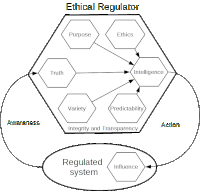Ethical regulator
The ethical regulator theorem[1] builds upon the good regulator theorem[2], which is ambiguous because being good at regulating does not imply being good ethically. "The ethical regulator theorem claims that the following nine requisites are necessary and sufficient for a cybernetic regulator to be both effective and ethical:
- Purpose expressed as unambiguously prioritized goals.
- Truth about the past and present.
- Variety of possible actions.
- Predictability of the future effects of actions.
- Intelligence to choose the best actions.
- Influence on the regulated system.
- Ethics expressed as unambiguously prioritized rules.
- Integrity of all subsystems.
- Transparency of ethical behavior.

Of these requisites, only the first six are necessary for a regulator to be effective. The three requisites ethics, integrity, and transparency are optional if a system only needs to be effective. This gives rise to the Law of Inevitable Ethical Inadequacy, which states "If you don't specify that you require a secure ethical system, what you get is an insecure unethical system." The reason is that unless ethical adequacy is a requirement, a system design will tend to optimize for effectiveness, and therefore maximally ignore the optional ethical, integrity, and transparency dimensions, which inevitably results in a design and subsequent implementation that is ethically inadequate and vulnerable to manipulation.
Effectiveness of a regulator
The ethical regulator theorem shows that the effectiveness of a cybernetic regulator depends on the strength or quality of six requisites. The effectiveness of a regulator, R, at achieving a given goal can be expressed as the function:
EffectivenessR = TruthR x (VarietyR - EthicsR) x PredictabilityR x IntelligenceR x InfluenceR
If two systems, A and B, are competing for control of a third system, C, and EffectivenessA "is greater than EffectivenessB, then A is more likely than B to win control of C".
The effectiveness function reflects how the variety of actions that are available to an ethical regulator is reduced by all actions that are considered unethical, which puts an ethical regulator at a disadvantage when competing against an unethical competitor.
See also
References
- M. Ashby, "Ethical Regulators and Super-Ethical Systems", 2017
- R. C. Conant and W. R. Ashby, "Every good regulator of a system must be a model of that system", Int. J. Systems Sci., 1970, vol 1, No 2, pp. 89–97